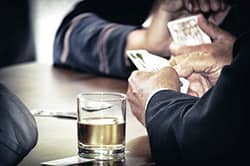Gambling Addiction Treatment Centers
 Many people gamble from time to time. But for some, it becomes highly problematic. Addictive gambling can result in reduced quality of life, bankruptcy, and divorce. 1
Many people gamble from time to time. But for some, it becomes highly problematic. Addictive gambling can result in reduced quality of life, bankruptcy, and divorce. 1
It is important for loved ones to recognize the signs of problem gambling in order to get help for the addicted family member. Gambling addiction can also lead to increasing debt and stress on family relationships, along with potential loss of employment.
Treatment for gambling addiction can take place on a full-time or part-time basis. Inpatient programs offer 24/7 supervision and support, while outpatient programs meet a set number of times during the week. Treatment may also involve the use of medications, such as naltrexone, and therapeutic interventions, such as cognitive behavioral therapy. Free support groups, such as Gamblers Anonymous, are also available.
What Is Gambling Addiction?
Most problem gambling occurs in younger and middle-aged men.
Gambling addiction involves persistent, problematic patterns of gambling behavior. The behavior leads to impaired functioning, reduced quality of life, and issues with finances, relationships, and employment.
Like other addictions, gambling addiction develops over time. It can begin in adolescence or during young adulthood, or it may become a problem in middle age and beyond. 3 But recent studies indicate that most problem gambling occurs in younger and middle-aged men. 3,4 The most common gambling activities are lotteries, scratch cards, sports betting, and gambling machines. 4
Gambling addiction can be particularly problematic during periods of stress or depression. 3 In addition, studies have found that many people that struggle with gambling also abuse alcohol. 5
Symptoms
Symptoms of gambling addiction include the following: 3

- Feels the need to gamble with increasingly larger amounts of money
- Has unsuccessfully tried to cut back on or quit gambling
- Becomes anxious or annoyed when attempting to reduce or stop gambling
- Often thinks about gambling (e.g., thinking about reliving gambling experiences or the next gambling episode)
- Often gambles when upset (e.g., helpless, guilty, anxious, depressed)
- Following a loss, often returns another day to win back money (“chasing” losses)
- Lies to hide the degree of gambling
- Has risked or lost a significant relationship, job, or educational opportunity due to gambling
- Depends on other people for money to deal with financial situations caused by gambling
Additionally, people that have a problem with gambling often struggle with other mental health conditions. Many rehab facilities can treat the gambling addiction along with other mental illnesses.
- Major depression is among the most common mental disorders that occurs with gambling addiction. Many of these same people report a history of childhood abuse and neglect. 9 Bipolar disorder is also a frequent co-occurring illness with problem gambling. 10
- Research suggests increased rates of alcohol/drug abuse with this disorder. 3
- Gambling addiction is associated with suicidal ideation (thoughts about suicide) and attempts. 21,22
- Antisocial personality disorder, in which a person has a long-term pattern of manipulating or violating the rights of other people, may co-exist with gambling addiction. 11
Causes
Even if a person has a genetic predisposition, other factors, such as stress and trauma, can play a role.
It is well-known that addiction clusters in families, with growing scientific evidence that genetics contributes to gambling addiction. 7
Gambling problems are more frequent in identical twins (monozygotic) than in fraternal (dizygotic) twins. 3,23 Twin studies suggest that genetics may play a bigger role than environment in developing addiction to gambling. One twin study suggests that your genes can contribute 50%-60% to the chances of developing this addiction. 13 Another study found a 49% likelihood of both male twins being gamblers and a 55% likelihood of both female twins being gamblers, and it found no relationship between development of gambling problems and a shared environment. 23
However, even if a person has a genetic predisposition, their genes are not likely to be the sole cause of the addiction. Other factors, such as stress, trauma, and exposure to gambling, can play a role.
Personality Characteristics
Impulsiveness, novelty-seeking, competitiveness, restlessness, and boredom are common traits among those addicted to gambling. 3, 8 Additionally, personality disorders have been reported in this group. 8
Research suggests that mood and anxiety disorders, such as major depression and anxiety, may precede gambling problems, which in turn become the coping mechanism for the depression or other illness. 13
Getting Treatment
 Even though gambling addiction treatment is available, only a small number of those that need treatment seek it. Some want to handle the problem on their own, while others don’t know where to get help. Others are too ashamed of their gambling behavior and suffer silently and alone. 1
Even though gambling addiction treatment is available, only a small number of those that need treatment seek it. Some want to handle the problem on their own, while others don’t know where to get help. Others are too ashamed of their gambling behavior and suffer silently and alone. 1
Therapies
Cognitive behavioral therapy (CBT) is a common therapy used to treat people that have an addiction to gambling. Therapists work with gamblers to identify thoughts and beliefs that contribute to addiction. Gamblers learn to change the old habits and behaviors and learn and implement new ones. 13 CBT is just one of many interventions available, but it has a very high success rate. 13
It is essential to address financial responsibilities during treatment. Gamblers learn budget management and develop a payment plan for their debts. This component of treatment can reduce the stress and hopelessness associated with financial debt. 15
Medications
A number of studies suggest that certain medications may help treat the urges, thoughts, and behaviors associated with gambling addiction.
The opioid receptor antagonist naltrexone may help reduce cravings and gambling urges. 13 Other medications include selective serotonin reuptake inhibitor (SSRI) antidepressants. 13
Gamblers Anonymous
Gamblers Anonymous is a 12-step self-help program that many people use in addition to treatment. GA helps many people recover from their addictions by encouraging their sharing of common addiction-related problems, experiences, and feelings in a group setting. The common experience supports and motivates people to change and maintain recovery. 16
As people work through the 12 steps of GA, they surrender to a “higher power” (as they understand that concept) and express their willingness to have that higher power remove shortcomings and past harms that may keep them stuck in addictive thinking.
Inpatient and Outpatient Treatment Programs
 Inpatient and outpatient are the main types of treatment centers for gambling addiction.
Inpatient and outpatient are the main types of treatment centers for gambling addiction.
- Inpatient centers offer a high level of medical supervision and safety. An inpatient program can help interrupt the constant craving and obsession associated with addictive gambling at a time when the person is trying to change. 17 Inpatient programs may last from 30 days to 90 days, and they will usually include individual and group therapy, medical treatment as needed, education, and family/support group meetings, along with attendance at 12-step meetings such as Gamblers Anonymous (GA).
- Outpatient rehabs allow the person to maintain their daily routine. The person can practice coping skills at home and in work situations while they remain engaged in treatment several days per week. While in treatment, the person can also use support systems in their local community, such as 12-step groups.
Many gambling addiction treatment centers emphasize integrated treatment of both the gambling addiction and other co-occurring mental disorders or alcohol/drug addiction. If you or someone you love struggles with gambling addiction as well as drug abuse and/or major depression, for example, make sure your treatment plan will focus on simultaneously managing all issues.
Aftercare
Long-term care or aftercare can help maintain and strengthen the success made in early treatment. It usually consists of outpatient therapy, ongoing education, and/or participation in 12-step support groups.
Aftercare programs discourage addictive behavior and offer a supportive social network of individuals in recovery. These programs are widely available and can be attended for extended periods.
Remember, addiction to gambling is a disorder that affects many aspects of a person’s life. The recovering gambler needs long-term support to solidify the new way of living. Getting treatment can help the person break the cycle of addiction. But they need to create a long-term plan to prevent relapse.
Sources
- Grant, J.E., and Odlaug, B.L. Diagnosis and Treatment of Gambling Disorder. In: Rosenberg, K.P., and Feder, L. C., Editors. Behavioral Addictions: Criteria, Evidence, and Treatment. Boston, Massachusetts: Elsevier. 2014:35-59.
- Grant, J.E., Odlaug, B.L., and Schreiber, L.R.N. Chapter 39: Pathologic Gambling: Clinical Characteristics and Treatment. In: Ries, R.K., Fiellin, D.A., et al., Editors. The ASAM Principles of Addiction Medicine. Fifth Edition. Philadelphia, PA: Wolters Kluwer. 2014:575-587.
- American Psychiatric Association. (2013). Diagnostic and statistical manual of mental disorders (Fifth ed.). Washington, D.C.: Author.
- Calado, F., and Griffiths, M.D., (2016). Problem gambling worldwide: An update and systematic review of empirical research (2000-2015). J Behav Addict 5(4), 592-613.
- Petry, N. M.; Stinson, F. S.; and Grant, B. F. (2005). Comorbidity of DSM-IV Pathological Gambling and Other Psychiatric Disorders: Results From the National Epidemiologic Survey on Alcohol and Related Conditions.The Journal of Clinical Psychiatry 66(5), 564-574.
- Whiting, M.W., Potenza, M.N, et al. (2016). Investigating Veterans’ Pre-, Peri-, and Post-Deployment Experiences as Potential Risk Factors for Problem Gambling. J Behav Addict 5(2), 213-220.
- Lobo, D.S., and Kennedy, D.L. (2006). The genetics of gambling and behavioral addictions. CNS Spectr. 11(12), 931-9.
- Black, D.W., Coryell, W.H., et al. (2015). Personality Disorders, Impulsiveness, and Novelty-Seeking in Persons with DSM-IV Pathological Gambling and Their First-Degree Relatives. J Gambl Stud. 31(4), 1201-14.
- Quigley, L., Yakavenko, I. (2015). Comorbid Problem Gambling and Major Depression in a Community Sample. J Gambl Stud 31(4), 1135-52.
- Di Nicola, M., De Risio, L., et al. (2014). Bipolar disorder and gambling disorder co-morbidity: current evidence and implications for pharmacological treatment. J Affect Disord. 167, 285-98.
- Wang, X. (2006). Antisocial personality disorder and gambling: Comments on Pietrzak and Petry (2005). Addiction 101(5), 748-9.
- Mee-Lee, D., Shulman, G.D., et al., Editors. The ASAM Criteria: Treatment Criteria for Addictive, Subrance-Related, and Co-Occurring Conditions. Third Edition. Chevy Chase, Maryland: ASAM/Change Company. 2013: 17-38.
- Yau, Y.H.C., Potenza, M.N., (2015). Gambling Disorder and Other Behavioral Addictions: Recognition and Treatment. Harv Rev Psychiatry 23(2), 134-136.
- Carroll, K.M. Cognitive Behavioral Therapies. In: Miller, P.M., Editor. Interentions for Addiction: Comprehensive Addictive Behaviors and Disorders. Volume 3. San Diego, California: Elsevier. 2013:23-28.
- Korn, D.A., and Schaffer, H.J. Massachusetts Department of Public Health’s Practice Guildelines for Treating Gambling-Related Problems. Massachusetts Council on Compulsive Gambling. January, 2004.
- NAADAC. The Basics of Addiction Counseling: Desk Reference and Study Guide. Module II. Addiction Counseling Theories, Practices and Skills. Tenth Edition. 2009
- Weiss, R.D., Potter, J.S., and Ianucci, R.A. Inpatient Treatment. In: Galanter, M., Kleber, H.D., Editors. The American Psychiatric Publishing Textbook of Substance Abuse Treatment. Fourth Edition. Washington, DC: American Psychiatric Publishing Inc. 2008: 445-458.
- Finney, J.W., Moos, R.H., and Wilbourne, P.L. Effects of Treatment Setting, Duration, and Amount on Patient Outcomes. In Ries and Fiellin. 418-427. Previously Cited.
- Scheffler, S. Assessment and Treatment of Clients with Co-Occurring Psychiatric and Substance Use Disorders. In: Strausner, S., Editor. Clinical Work with Substance-Abusing Clients. Third Edition. New York, NY: Guilford. 2014: 371-394.
- Hser, Y-I, and Anglin, M.D. Drug Treatment and Aftercare Programs. In: Coombs, R.H., Editor. Addiction Counseling Review. Mahwah, New Jersey: Lawrence Erlbaum Associates. 2005: 447-465.
- Manning, V, Koh, P.K., et al. (2015). Suicidal ideation and lifetime attempts in substance and gambling disorders. Psychiatry Res 225(3), 706-9.
- Battersby, M., Tolchard, B., Scurrah, M., and Thomas, L. (2006). Suicide Ideation and Behaviour in People with Pathological Gambling Attending a Treatment Service. International Journal of Mental Health Addiction 4, 233-246.
- National Health Service. (2010). Gambling addiction linked to genes.
